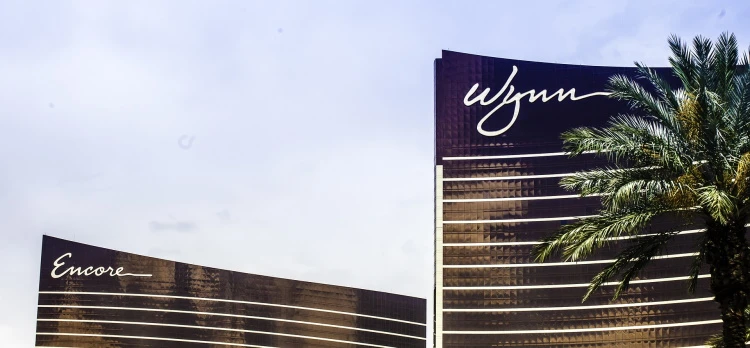Wynn sees revenue fall nearly 9%, delays projects as CEO Billings downplays tariff impacts

Wynn Resorts became the latest casino operator to downplay concerns related to tariffs and consumer softening on Tuesday, despite posting an 8.6% year-on-year revenue decline to $1.7 billion along with an array of other declines.
Group net income was halved from $144.2 million a year ago to $72.7 million this quarter. Diluted net income per share was also cut approximately in half from $1.30 per share in 2024’s first quarter to $0.69 this year.
The company said in a release that “operating revenues decreased $81.8 million, $51.0 million, $11.3 million and $8.6 million at Wynn Macau, Wynn Palace, our Las Vegas Operations and Encore Boston Harbor, respectively, from the first quarter of 2024.”
Group adjusted property EBITDAR for the quarter was $532.9 million, a 17.5% decrease YoY. Wynn Macau, Wynn Palace, Las Vegas operations and Encore Boston Harbor saw adjusted EBITDAR declines of $40.7 million, $40.5 million, $22.9 million and $5.7 million, respectively.
Impact on opex ‘low and entirely manageable’
Much like other Las Vegas-facing casino operators, Wynn attributed these declines in part to tough comparisons from hosting the Super Bowl last year. When excluding Super Bowl weekend from calculations, the company said, there were actually a number of YoY increases for the period.
But analysts were eager to see how Wynn CEO Craig Billings would react to the current economic environment, especially as Wynn is perhaps the highest-end luxury brand in gaming. Billings addressed the topic right away, opening Tuesday’s investor call with it.
“We expect the direct impact from tariffs on OpEx to be low and entirely manageable with most of the impact in the US stemming from food and beverage, where we are actively working though alternative sourcing for the most impactful items,” he said in prepared remarks.
Billings later said in response to questions that there will likely be a decrease in travel, but “it doesn’t really impact us much at all”. While he did caution that things could change, right now “everything is pretty good, actually”.
CapEx, however, “is a different story”, he said.
$375 million worth of projects delayed
The company announced it is “reassessing the timing, scope and sourcing” of projects at Wynn Las Vegas “representing approximately $375 million of previously disclosed project capital expenditures”.
“While we’re staying nimble, the pace of change at the moment is just too significant to commit to any revised timing on that CapEx,” Billings said on the call.
The biggest item from the budget was a renovation project at the Encore tower in Las Vegas. Billings estimated that to be in the “high $200s” of the $375 million total. He indicated to analysts that the projects were not cancelled altogether, just placed on hold.
Despite this, Wynn managed to buy back $200 million worth of shares during the quarter and the company announced on Tuesday that its board has declared a $0.25 per share cash dividend, payable on 30 May. As of 31 March, Wynn had $2.07 billion in cash on hand and $10.5 billion in total debt.
Al Marjan progressing
Company officials gave updates on the Al Marjan Island joint venture in the United Arab Emirates, which Billings has repeatedly called the most promising gaming development any company currently boasts. Wynn owns 40% of the venture, alongside partners Marjan and RAK Hospitality Holdings.
During Q1, Wynn contributed a total of $51.2 million in cash toward the development, which now has reached the 47th floor. The company’s total contributions now sit at $682.9 million.
When asked how tariffs might impact construction, Billings asserted that everything is still on track for a 2027 opening. Most of the materials have already been purchased, he said, which will help avoid extra costs.
New York still alive
The chance for a New York casino licence was another topic of interest on Tuesday, given Wynn’s $12 billion Hudson Yards bid with Related Companies and Oxford Properties Group. Two initial applicants – Hudson’s Bay Co and Las Vegas Sands – have formally pulled their bids ahead of the 27 June deadline. LVS is a noteworthy comparison to Wynn, as both are luxury resort operators with concerns about competition from online gaming.
Billings said New York is “a great potential market”, but also “a complicated market with a lot of considerations”. Like LVS, he said the threat of iGaming legalisation in New York was “a point of concern”. He did not indicate any plan, however, to pull the bid outright.
The partners’ Hudson Yards proposal was changed significantly in late April by more than doubling the housing commitment from 1,500 units to 4,000. This had been the biggest contention from opponents, but several hurdles remain between now and when licences are awarded at the end of the year.
“We continue to be in the running in New York, but we absolutely will not get over our skis to win a licence there,” Billings told analysts.
Elsewhere in Asia
Other two notable locales discussed on the earnings call were Japan and Thailand, which both have had ups and downs in terms of attractiveness for gaming investment. Japan, which once had several potential bidders, has been whittled to just one project – MGM Osaka – whereas Thailand came very close to a massive casino expansion this spring before pulling legislation for further review.
With regard to Thailand, Billings said there were some “components of the bill that probably won’t work”. This might have been an allusion to extensive wealth and background checks for patrons, which have been controversial thus far.
In Japan, there have been reports the country may open a second round of bidding for up to two additional licences. Wynn previously signalled interest in the market but ceased operations there in 2020. Billings said there were “structural challenges” there and seemed bearish on the market overall .
“We’ve got plenty of development opportunities,” he said. “We’d only look at Japan if the setup was right.”
